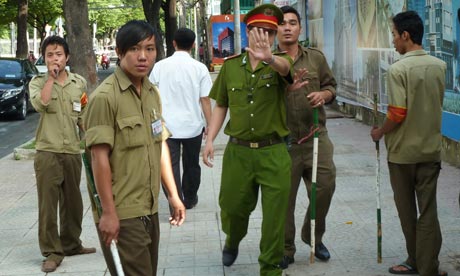
The Guardian -Tuesday 25 October 2011 16.19 BST:
Nguyen Thu Tram and Nguyen Ngoc Quang threatened with imprisonment after collaborating with the Guardian on a story about harassment of pro-democracy activists
Two Vietnamese dissidents have fled the country under the threat of imprisonment or worse after collaborating with the Guardian on an article that highlighted a mounting crackdown in the country.In addition, the correspondent who wrote the story, freelancer Dustin Roasa, was detained as he tried to return to Vietnam recently and held overnight at Ho Chi Minh City's Tan Son Nhat airport before being put on a flight out of the country the next day. "You are not welcome in Vietnam for security reasons," Roasa was told.

A policeman, flanked by local militia members, tries to stop a foreign journalist from taking pictures outside the Ho Chi Minh City people's court, where a human rights case was taking place in August. Photograph: Ian Timberlake/AFP/Getty Images
The article published in January exposed how dozens of pro-democracy activists were monitored, harassed, arrested, beaten and imprisoned for challenging the authority of the Communist party. Two dissidents quoted, Nguyen Thu Tram and Nguyen Ngoc Quang, were forced to flee Vietnam under threat of arrest and now live uncertain lives as refugees, all for speaking to a foreign reporter.
Roasa set up a series of meetings during a two-day trip to Vietnam in January. His rendezvous with Nguyen Thu Tram in a cafe passed off without incident.
But when Nguyen Thu Tram returned to her mother-in-law's house, she found the police waiting for her. They returned several times that day to question her about meeting with Roasa. The next day, she moved to a church to protect her family, but the authorities found her there. A group of police showed up, beat a female pastor in the head with a baton until she collapsed bleeding, and threatened to arrest Nguyen Thu Tram.
"I knew I could not stay in Vietnam, because I wasn't safe," she said. "I had no other option. I had to go." The authorities began harassing her relatives, such that her mother and youngest sister decided to leave Vietnam, too, despite having no involvement in political activism.
Roasa said that when he returned to the hotel, he was pulled to one side by a receptionist. She told him the security police had come to ask about him. "You must have done very bad things," she said. "Run, before they come back for you."
Roasa told the Guardian: "I didn't want to endanger anyone, so I called them on Skype to let them know what had happened. No one was surprised, as they were all accustomed to being monitored regularly. Two of them agreed with me that it was too dangerous to meet."
But Nguyen Ngoc Quang insisted that the meeting go ahead. He brought along two friends: a dissident lawyer who often challenges the authorities on human rights violations in the government-controlled courts, and an English-speaking friend to interpret. After the interview, Nguyen Ngoc Quang and his lawyer friend prepared to drive away on a motorbike. They were immediately surrounded by plainclothes agents, also on motorbikes. A high-speed chase ensued, before Nguyen Ngoc Quang's lawyer friend managed to drop him at a large apartment block.
There, he took off a layer of clothes and covered his face with a surgical mask commonly used in south-east Asia to fend off dust. He slipped out past the 30 or so agents he estimates were in the vicinity. "It was audacious for me to leave like that, but they weren't expecting it," he said later. Upon hearing from a well-placed friend that he faced substantial prison time, he left the country that day with the help of the country's dissident network.
Nguyen Ngoc Quang has been granted refugee status by the UN and awaits settlement in a third country. Nguyen Thu Tram's case is still being processed, but there is reason to be hopeful that she, too, will be granted refugee status.
Tuesday 25 October 2011

No comments :
Post a Comment